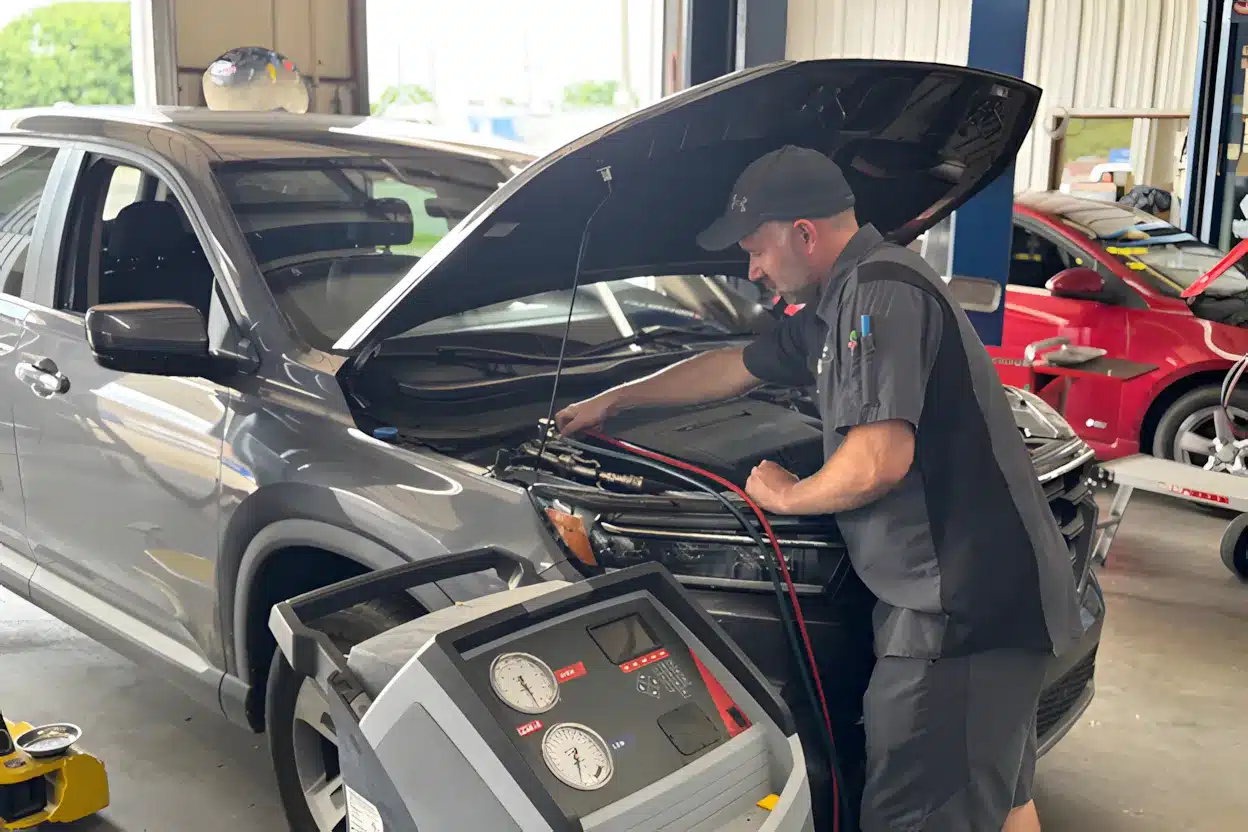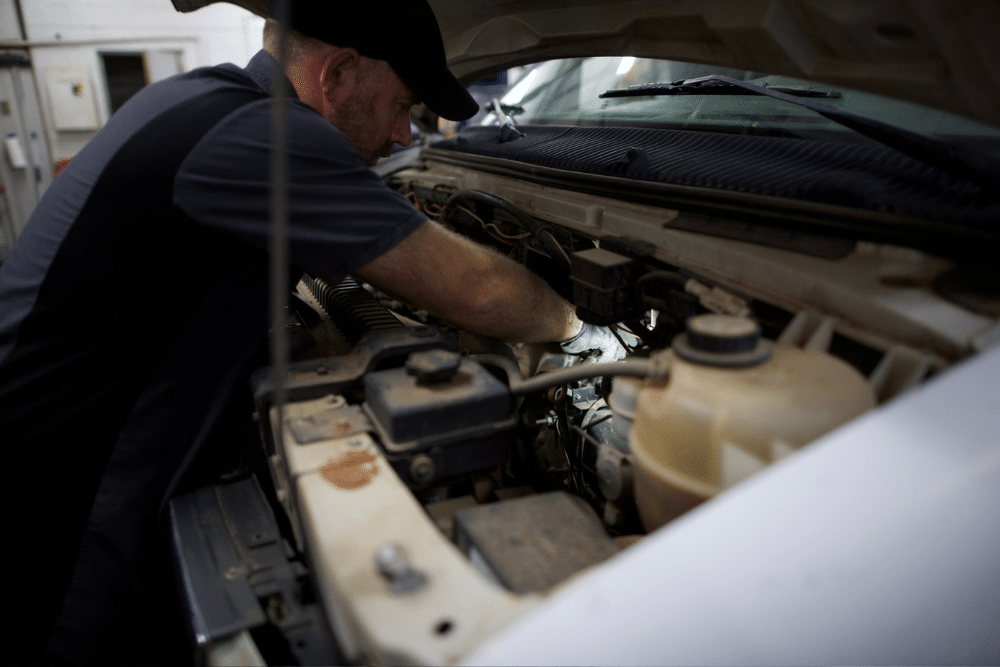You don’t need a heatwave to remind you your car’s A/C is fading, or that strange noise under the hood might be more serious than you thought. When temperatures start climbing in Tecumseh and surrounding areas, even the smallest issues can quickly escalate into costly repairs or unexpected breakdowns.
What’s your car trying to tell you before it leaves you stranded?
At Miller Brothers Automotive, we know what Oklahoma heat really does to vehicles. From weakening A/C performance to triggering check engine lights at the worst time, summer stress can uncover problems you didn’t know you had. The good news? Catching these signs early could save you time, money, and a whole lot of sweat.
Here’s what to watch for, and what to do about it before the heat gets the best of your ride.
Understanding Why Heat Breaks Cars
Extreme heat can push both your vehicle’s air conditioning and engine to the brink. While A/C issues are easy to notice (warm air blowing from vents is hard to ignore), engine stress is often silent—until it becomes a big problem.
What the Heat Does to Your A/C System
Your car’s air conditioning relies on a complex series of components: the compressor, condenser, evaporator, refrigerant, and more. Under normal conditions, these systems handle the job. But add in hot, humid air, and even a small leak or low refrigerant level becomes a big deal.
If your A/C isn’t cooling like it used to, or it seems to shut off and on, you’re not imagining it. High outside temperatures make your A/C system work harder, which speeds up wear and exposes hidden issues. Left unchecked, these small signs often lead to complete failure.
What the Heat Does to Your Engine
Engines run hot by design, but in high summer heat, the cooling system works overtime. If there’s a small issue with your radiator, thermostat, or coolant levels, it often surfaces when outside temperatures spike.
This is also the time when warning lights start appearing—especially the check engine light. It’s tempting to ignore that little glow on your dash, but it’s a signal that your vehicle’s computer has detected something wrong. Overheating, misfires, and even emissions failures become more common in the heat.
Common Summer Car Problems in Oklahoma
If you’ve searched for “engine diagnostics near me” or “auto AC service Oklahoma”, you’re not alone. Here are the issues that show up most often during the hottest months:
- A/C blowing warm air
- Weak airflow from vents
- Odd smells when the A/C is on
- Check engine light flashing or staying on
- The temperature gauge is creeping higher than normal
- Unusual noises during startup or while idling
These aren’t isolated issues. They’re all symptoms that your vehicle is under thermal stress—something that’s especially common in late summer, when systems are already fatigued from earlier months of use.
What Most Drivers Don’t Realize About “Little” Issues
Here’s something most drivers overlook: small A/C or engine problems rarely stay small. That slight lag in cooling or faint rattle under the hood is often a warning shot, not the whole problem.
We often see vehicles come in with what owners thought was a “minor” A/C issue, only to find a compressor beginning to seize or refrigerant loss, pointing to a leaking evaporator coil. Likewise, that flashing check engine light might seem harmless at first, but in summer, it can be the result of engine misfires caused by overheating components.
By the time symptoms become too obvious to ignore, you may already be facing a more expensive repair. Catching these issues early—when they’re just a hint of something off—can save you money, time, and frustration.
Beyond the Codes: The Truth About Real Diagnostics
Not all diagnostics are created equal. Googling symptoms or buying a code reader gives you surface-level data. But modern vehicles are more complex than ever. Today’s cars rely on intricate networks of sensors, modules, and onboard computers.
A basic scan might tell you there’s a misfire, but not why it’s happening. The “why” is what matters—and that takes experience, tools, and time. It’s why true diagnostics go deeper than just reading codes. They include:
- Live data analysis
- Pressure testing
- Component inspection
- Visual verification
- Functional testing
All of this helps you move beyond the guesswork and into real solutions.
Think Like a Technician: Real-World Process for A/C & Engine Diagnosis
Let’s walk through a real diagnostic approach—not a hypothetical one, but the kind of process used by expert technicians.
For A/C Concerns:
- Interview the Driver: How long has this been happening? Is it intermittent? Any past repairs?
- Check Ambient & Vent Temps: Establish performance benchmarks.
- Gauge Readings: Measure system pressure in both static and running states.
- Refrigerant Recovery & Leak Testing: Use UV lights and CO2 pressure testing to locate leaks.
- System Rebuild: Replace damaged components and recharge to spec.
- Verification: Test drive, retest system, recheck pressures.
For Check Engine Lights:
- Scan for Codes: Look for stored, pending, and historical codes.
- Inspect Related Systems: Cooling, ignition, fuel delivery, emissions.
- Perform Functional Tests: Use bi-directional scan tools to command components on/off.
- Evaluate Sensor Data in Real-Time: Identify out-of-range or intermittent signals.
- Confirm Fix Before Delivering: Test drives, system resets, and post-repair verification.
This process reflects both the depth of service and the precision that separates a quick fix from a lasting repair.
Where Precision Meets Professionalism: Miller Brothers Automotive
The heat will keep coming. Warning lights will still flash. But having a shop that’s built for the long haul? That makes all the difference.
Miller Brothers Automotive exists for drivers who value quality, care, and real answers. Born from the simple idea that repairs should be done right the first time, this shop has grown into one of the most trusted names in Tecumseh. It’s not just the tools or the certifications, it’s the commitment to doing right by every customer who walks through the door.
Certifications and Tools That Matter
- ASE Master Certified Technicians
- L1 Advanced Engine Performance Certified
- Snap-On Diagnostic Tools
- FDRS Ford Laptop & Factory-Grade Software
- Robinair A/C Machines for Modern Systems
Not sure what’s causing the issue? You’re not expected to be. That’s what we’re here for. Dive into the details behind our A/C repair and engine diagnostic process to see how we take the guesswork out of summer car problems.
The Experience You Deserve From Your Repair Shop
From the first phone call to the moment your vehicle’s ready, our process is built to make things clear, smooth, and hassle-free. Here’s how we do it:
- Drop-off only service: No waiting area means faster workflows and full focus on the repairs
- Upfront communication: You’ll know what we’re checking, what it costs, and what’s next
- Transparent results: No jargon—just honest answers and clear solutions
- Warrantied work: Backed by a 2-year/24,000-mile nationwide warranty
Need convenience? You’ve got it. We offer online and text-to-pay options, a secure night drop, and a climate-controlled shop that helps our team stay at their best, so your car gets the same.
Frequently Asked Questions
How often should I service my car’s A/C system in Oklahoma?
In Oklahoma’s climate, it’s a good idea to have your A/C system inspected at least once a year, ideally in the spring before the heat sets in. Even if your A/C seems to be working, regular checks can catch low refrigerant levels, worn components, or minor leaks before they lead to major failures.
Can a failing A/C system affect fuel efficiency?
Yes, a malfunctioning A/C system—especially one with a failing compressor—can place additional strain on your engine, causing it to work harder and burn more fuel. While the impact may be small at first, over time it adds up, especially in stop-and-go traffic.
What’s the difference between an OBD-II scan and a full engine diagnostic?
An OBD-II scan simply pulls stored error codes from your vehicle’s computer, but it doesn’t explain why. A full diagnostic includes a technician’s interpretation of those codes, along with mechanical testing, sensor evaluation, and live data analysis to accurately identify the root cause of a problem.
Are engine diagnostics only needed when the check engine light comes on?
Not necessarily. Subtle signs like rough idling, reduced fuel economy, hard starts, or even a new exhaust smell can point to deeper issues. In many cases, a diagnostic check can catch problems before warning lights appear, potentially saving you from bigger repairs.
Is it okay to drive with a weak A/C if the engine is still running fine?
While it might seem like just a comfort issue, weak A/C can signal deeper problems, such as electrical faults or refrigerant leaks that may affect other systems. Also, in high heat, poor cabin cooling can lead to driver fatigue and discomfort, which is a real safety issue on long drives.
Book Your Visit with Miller Brothers Automotive Today
When your car’s acting up, you don’t need a guessing game; you need answers. If the A/C is struggling or something just doesn’t feel right under the hood, let’s take a look. We’ll tell you what’s going on and fix it with the kind of precision and care your car deserves.
We work with drivers across Tecumseh, Shawnee, McLoud, Macomb, and Seminole, with specialties in A/C systems, engine diagnostics, and high-quality suspension and brake work.
Schedule now at www.millerbrothers.us
Call us at (405) 598-0220
Or stop by 201 E Walnut Street, Tecumseh, OK 74873




